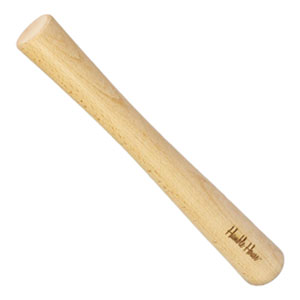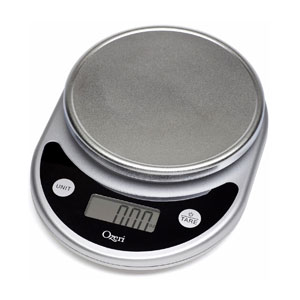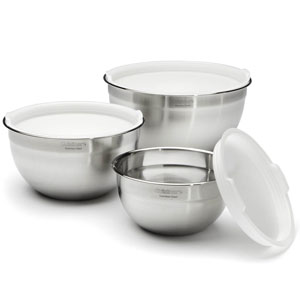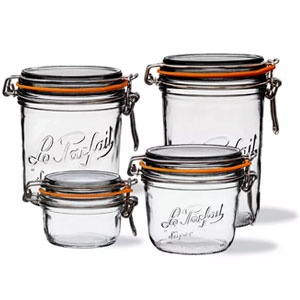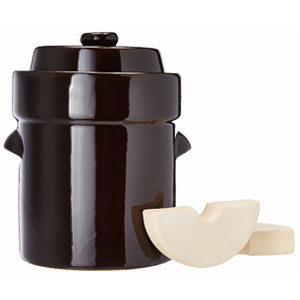
Fermentation Crock
Fermentation crocks are vessels specifically designed for fermenting foods and beverages. They are typically made of ceramic which prevents harmful light UV rays from reaching fermenting foods. They also allow for the escape of gas which can cause other unsuitable vessels, such as mason jars, to explode. Fermentation crocks are available in an array of sizes, colors and styles suitable for making a variety of foods like kombucha, pickles, sauerkraut, kimchi, sourdough and more!
from $29.95
Vegetable Stomper
Sometimes called “sauerkraut pounders” or “cabbage tampers”, vegetable stompers do exactly what you would expect – stomp vegetables! Their purpose is to extract as much liquid as possible from vegetables prior to fermentation to build up a large amount of brine. Your fermenting vegetables should stay submerged in brine throughout the fermentation process to prevent exposure to air and ultimately spoilage and a vegetable stomper makes brine extraction easy.
An extra long one like the Sauerstomper has an additional 4 inches on the competition making it ideal for use with fermentation crocks while still being compatible with mason jars.
$16.95
Kitchen Scale
Getting the right amount of salt is critical in fermentation to prevent rot and over-salinization. The most accurate way to determine your salt needs is to weigh your prepared vegetables with a simple kitchen scale and measure out 1 tablespoon of salt for every 1.75 pounds of food. We like this no-frills kitchen scale by Ozeri.
$11.50
Silicone Tongs
Getting fermented foods out of a water-sealed fermentation crock without contaminating them or making a mess can be a challenge. The narrow opening and weight of the crock is not conducive to just dumping the contents out and you may not want to dig in with your hands.
A longer set of tongs (at least 12 inches) will help you to get deep into the crock, get out with the goods with little to no mess. To prevent metal clanging against the ceramic and potentially chipping it, use silicone-coated tongs like these ones from Oxo. Both the heads and arms are coated to help prevent damage the base and mouth of your crock.
$14.99
Funnel & Strainer Set
The best types of vessels for storing fermented beverages like Kombucha, Kefir and Jun Tea are resealable swing-top bottles. To make the process of transferring your mixture to bottles easier, especially if you do not have a continuous brew crock with a spigot, you’ll want funnels with wide mouths and small spouts that fit snugly into bottle openings. You’ll also want a strainer to keep kefir grains and stray pieces of SCOBY out. We like this funnel and strainer combination set by OXO.
$8.95
Large Stockpot
Particularly when making fermented beverages, a large stockpot can make your life a whole lot easier. A batch of Kombucha begins with the boiling of at least 1-2 gallons of water (potentially more for continuous brew!) for steeping tea and dissolving sugar into. You don’t want your mixture coming up to the tippy top of the pot since vigorous stirring will cause it to spill over the sides and make a mess.
We recommend getting something much bigger like the massive 20-Quart Stockpot we use. It’s so big, it can even double as a mixing bowl when you’re making extra large batches of staple fermented foods you eat all the time like sauerkraut or pickles.
$37.99
SCOBY
If you want to make Kombucha, it may be tempting to buy the $5 bargain SCOBY off of Amazon, but we recommend going up a class in price and spending a little bit more. Remember, a SCOBY is a living thing and you will be ingesting its byproducts – you want to feel good about its quality and legitimacy of the company, which can be a challenge on Amazon.
We picked this one by Fermentaholics after doing some research on their facility (a lab in Florida licensed with the FDA) and product (USDA Certified Organic with great customer reviews) and it has worked great for us!
$11.39
Measuring Cups & Spoons
Nothing fancy here, just some long established brands making intuitive, durable, affordable products – we use all of these on a weekly basis and consider them to be some of our “but it for life” staples. For small measurements we like the black plastic measuring cups and measuring spoons from Oxo. They hold up to a beating and stack super neatly and compactly for storage.
For larger measurements we like the handled glass measuring cups from Pyrex in a few sizes. These are great because they can double as mixing bowls for combining ingredients in and can be microwaved!
From $7.99
Vegetable Prep Tools
Okay, you get it – we love Oxo! And Oxo does a great job helping us prepare vegetables so they are squeaky clean, free of any dirt or bacteria that could negatively impact our ferments. We use both their vegetable peeler and vegetable brush with nearly every recipe that includes root vegetables (think beets, carrots, ginger, etc.) which if you really think about it is most of them. They have comfortable to hold designs and will stand the tests of the time and heavy usage.
from $5.99
Carving & Cutting Boards
When making batches of things we eat all the time like sauerkraut, we like to go really big and bust out our 10L Sauerkrock. Filling that thing requires a ton of vegetables and using a standard-size cutting board is pain. The board gets overtaken so fast you find yourself constantly stopping cutting to clear it. This is where we prefer our carving board from Oxo. It’s huge and does not fit in the dishwasher, but the times we use it it is invaluable and we don’t mind having to hand wash.
For standard or smaller batches, the prep and utility cutting boards from Oxo are our go-to boards. We love this series because it is lightweight, non-porous, has a channel to catch liquid before it spills over onto your countertop and grips to keep it from sliding around.
from $9.99
Kitchen Knives
This 3-piece knife set from Chicago Cutlery has had us covered, no matter what a recipe throws our way, for the past 10 years and is still going strong. Halving, coring and slicing a large head of cabbage? The chef’s knife will make quick work of that. What about peeling and mincing a tiny piece of ginger? Turn to the paring knife that is great for use with smaller fruits and vegetables. And for everything in between? There’s a utility knife for that and it will prove itself to be a workhorse in your kitchen for making cuts big and small alike.
$34.57
Mixing Bowls
Most fermentation recipes require several small bowls (1 or 2-quart) to mix brines, spices and vegetables separately and one very large bowl (4 or 5-quart) to combine all the ingredients together. Stainless steel and glass are non-absorbent, non-corrosive materials that will not leech or impart any undesirable flavors into your recipes.
We mostly use this 3-bowl stainless steel set from Cuisinart because we love the higher walls, but also use this 4-bowl glass set from Pyrex frequently. Both come with lids so you will get a lot of general use out of them as well!
$23.01
Swing Top Storage Jars
After your batches have finished fermenting, fido jars (simply jars with sealing swing top lids) are a great storage option. We love them because you will never lose your lid and they are pretty enough to serve out of!
They come in a ton of sizes, but we recommend getting ones in the capacity range of 1-quart (32 oz.) to 3-quart (96 oz.) because they’re big enough to be useful but not so big that they’re difficult to manage or you can’t find fridge space for them. Also do yourself a favor and get the wide mouth versions for a less messy transfer process. Our favorites are the amazingly verstaile wide mouth “Super” jars by Le Parfait.
from $14.80
A Good Book
You absolutely do not need to have fancy equipment or be an expert in fermentation in order to enjoy it and be successful with it. However, it is one of those things where the more you know about the science behind it, the more fun you can have with it since you’ll be confident in getting creative!
There are hundreds of great fermentation books out but two universal ones that everyone could benefit from having in their library are The Art of Fermentation by Sandor Katz and The Noma Guide to Fermentation by René Redzepi. Both of these guys know their stuff and go deep across broad categories like core concepts, equipment and recipes.
